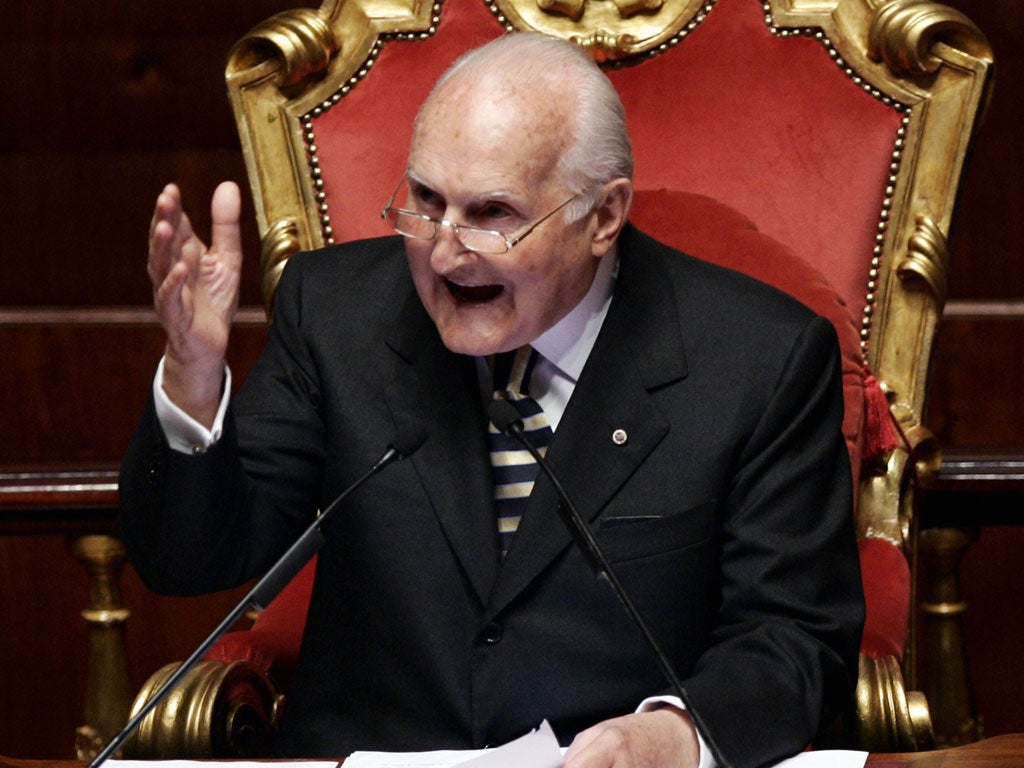Oscar Luigi Scalfaro: Former president of Italy, renowned for his honesty

Oscar Luigi Scalfaro was a Catholic politician whose anachronistic virtues, in particular his complete honesty and his commitment to the constitution, came to Italy's rescue during the gravest political crisis of the post-war era, the corruption scandal which erupted in 1993.
Born the son of a post office official in Novara, Piedmont, in the north-west but with family roots in the southern province of Calabria, Scalfaro's devoutness made itself apparent when he was still young: he joined the lay Catholic organisation Azione Cattolica at the age of 12. The event that changed the course of his life was a personal tragedy: his wife, Maria Inzitari, died in 1944 at the age of 20, a few weeks after giving birth to their daughter. Scalfaro vowed never to re-marry, dedicating himself to bringing up their daughter. Later she, too, pledged to stay single so she could remain by his side for life, and was at his bedside when he died.
Scalfaro's religious views were reflected in the stoutly traditionalist positions he took throughout his political career; and in the increasingly permissive context of Italy during the post-war boom he was often lampooned as a prig. Yet he was keenly aware that the separation of church and state was at the heart of Italy's post-war constitution, which he had played a part in writing, and when he rose to senior positions he was careful to prevent his religious convictions undermining his commitment to the secular state.
Scalfaro graduated in law from Milan's prestigious Cattolica university and practised as a magistrate before being selected as a prospective MP by the Christian Democratic Party that dominated Italian politics for 40 years. During his first decades in politics there were few signs that this short, wiry, old-fashioned figure would ever attain great heights: even though his notionally Catholic party was in power, he seemed too much out of sympathy with the way his country was evolving. The incident which engraved his personality on the Italian psyche occurred in 1950, in a restaurant in Rome, when a woman dining with friends nearby took off her jacket, revealing bare shoulders and Scalfaro leapt to his feet and denounced her; he later denied reports that he had also given her a slap. It was enough to establish his identity as a politician hopelessly out of step with the times, the representative of a world and an ethos that much of Italy had turned its back on.
He consolidated that reputation four years later when his right-wing patron Mario Scelba became prime minister and made him junior minister for the arts. Scalfaro took full advantage of the opportunities the job offered, taking the censor's scissors to films he judged lubricious and banning plays and TV serials he decided were immoral. He became a hate figure for the liberal left, but showed no signs of being intimidated. His thick skin was to prove invaluable later in his career.
In the early 1990s, with the break-up of the eastern bloc and the end of the Christian Democrats' role as de facto guardians of Nato's eastern flank, Italy was plunged into crisis. In 1992 Scalfaro was speaker of the house of deputies as parliament struggled and repeatedly failed to agree on a candidate for president. Then came the news that the Sicilian Mafia had murdered the crusading magistrate Giovanni Falcone, along with his wife and bodyguards, after the political establishment turned its back on him, and in a reflex of remorse and guilt, MPs united around the most upright of their number, Scalfaro, thrusting him into the presidency.
He was thus the incumbent president less than a year later when the so-called Tangentopoli ("Bribesville") scandal exploded, which led to the speedy collapse of both the Christian Democratic and Socialist parties. Throughout the crisis, during which 40 per cent of parliamentarians found themselves under investigation and the trust of Italians in their rulers plummeted to new lows, the rigid and old-fashioned yet avuncular figure of Scalfaro was one of the main factors holding Italy together. It was also noted that, although as president he saw plenty of Pope John Paul II, he never once kissed his ring: his loyalty to Italy's secular constitution was as solid as his probity.
With Silvio Berlusconi's meteoric rise to power in the wake of the Tangentopoli scandal, Scalfaro found himself pitted against a man who represented very different values: in the words of Vittorio Ragone, writing in La Repubblica, it was "sobriety versus sequins, substance versus appearance, rules against the arbitrary, a sense of the state versus a sense of personal interest." When Umberto Bossi of the Northern League abandoned Berlusconi's first coalition government after a few months, it was Scalfaro who stood up to the media mogul and insisted on his resignation. Relations between these two very different Italians never recovered.
Peter Popham
Oscar Luigi Scalfaro, politician: born Novara, Piedmont 9 September 1918; married Marianna Inzitari (died 1944; one daughter); died 29 January 2012.
Join our commenting forum
Join thought-provoking conversations, follow other Independent readers and see their replies
Comments
Bookmark popover
Removed from bookmarks